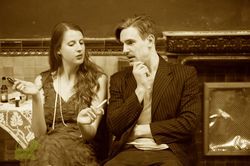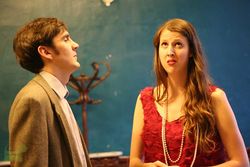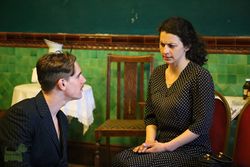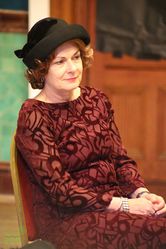Difference between revisions of "I am a Camera (2016)"
Mark Ireson (Talk | contribs) (→Crew) |
Mark Ireson (Talk | contribs) |
||
| (5 intermediate revisions by 3 users not shown) | |||
| Line 1: | Line 1: | ||
| − | [[Image: | + | [[Image:IAmACamera.jpg|thumb|300px|Poster by [[Bryon Fear]]]] |
by [[John Van Druten]] and [[Christopher Isherwood]] | by [[John Van Druten]] and [[Christopher Isherwood]] | ||
| Line 10: | Line 10: | ||
== Introduction == | == Introduction == | ||
| − | + | ''I Am a Camera'' is the story behind the musical ''Cabaret'', a distillation of Christopher Isherwood's stories in ''Goodbye to Berlin''. Christopher Isherwood is the central character, a writer living in Berlin in the early 1930s to get inspiration for his writing. He rents a room in a shabby house owned by the redoubtable Fraulein Schneider, who dotes on him. His fellow lodgers include the febrile Sally Bowles, a would be cabaret singer from a patrician background. To make ends meet, he teaches English to German students including Natalia Landauer, the daughter of a wealthy Jewish shop-owner. Friends who pass through include the dandy-ish Fritz, who hides a surprising secret and the American playboy, Clive. The play is set at the time when Hitler and the National Socialists had recently come to power in Germany and the characters are affected to different degrees by the impact of their rise. Despite its surface frivolity, the play has much to tell us about its era and setting. | |
== Cast == | == Cast == | ||
| Line 100: | Line 100: | ||
== Gallery == | == Gallery == | ||
| − | <gallery caption="Photos by [[Kait Feeney]] – rehearsal photos" widths=" | + | <gallery caption="Photos by [[Kait Feeney]] – rehearsal photos" widths="250px" heights="250px" perrow="5"> |
Image:IAACamera001.jpg | Image:IAACamera001.jpg | ||
| Line 106: | Line 106: | ||
Image:IAACamera004.jpg | Image:IAACamera004.jpg | ||
Image:IAACamera005.jpg | Image:IAACamera005.jpg | ||
| − | |||
[[Image:IAACamera006.jpg|Photograph by [[Káit Feeney]]]] | [[Image:IAACamera006.jpg|Photograph by [[Káit Feeney]]]] | ||
[[Image:IAACamera007.jpg|thumb|300px|Photograph by [[Káit Feeney]]]] | [[Image:IAACamera007.jpg|thumb|300px|Photograph by [[Káit Feeney]]]] | ||
| Line 132: | Line 131: | ||
== Reminiscences and Anecdotes == | == Reminiscences and Anecdotes == | ||
| − | + | The Director's view | |
| + | |||
| + | We talk with Lisa Thomas, director of next week’s production ''I Am A Camera'' and find out more about the play which inspired the musical Cabaret. | ||
| + | |||
| + | |||
| + | ''Tell me more about the play?'' | ||
| + | |||
| + | In the late 1920s and early 1930s, Christopher Isherwood was living in Berlin. He later wrote several short novels inspired by the people he encountered there. ''I Am a Camera'' is based primarily on ''Goodbye to Berlin'' and ''Sally Bowles'', and the novels and the play eventually formed the basis of the musical, ''Cabaret''. The story is seen through the eyes of a young writer – called ‘Christopher Isherwood’ in the play but not necessarily a portrait of the man himself – for example the play makes no mention of his homosexuality. To some extent he is the almost neutral ‘camera’ that he defines himself as in his opening speech. The play is set in 1930, when Hitler’s National Socialist Party was on the rise in Germany, and we see the early impact of Nazism on ordinary people through the experiences of the German characters. | ||
| + | |||
| + | |||
| + | ''Why did you decide to direct it?'' | ||
| + | |||
| + | I have long been a fan of ''Cabaret'' – and have been trying to put it on for years but with no success in getting the rights. When it became clear we wouldn’t get the rights again this year, I thought I’d go back to the source play which isn’t performed all that often. I liked it a lot – I thought it was witty and often poignant with a subtlety that has probably grown with time. When it was first performed in the early 1950s, just a few years after the end of the Second World War, some critics felt that the impact of the Nazis was soft-pedalled by the playwright, John van Druten. In retrospect, I think the light touch he employed works better than a more didactic approach. | ||
| + | |||
| + | |||
| + | ''Have there been any major challenges in staging the play?'' | ||
| + | |||
| + | We’re performing in the Upper Hall at Stanley Halls which is a big green room with a high ceiling and slightly Gothic arches, and we’re trying to conjure an intimate room in a tatty Berlin boarding house with a minimal set. As a result, we have an absolute multitude of props to give a sense of atmosphere from teddy bears to underwear, typewriters to wash stands. Fiona Daffern, my assistant director, has done an extraordinary job in pulling it all together. | ||
| + | |||
| + | |||
| + | ''Do you think the play will be appealing to audiences who are expecting to see Caberet?'' | ||
| + | |||
| + | I suspect some people will come with an expectation that it will be ''Cabaret'' without music and there are shared elements – but much that is different. The arresting (and very English) Sally Bowles is central to the story and we’re told that she is a nightclub singer; however, we never have any evidence of her talent – or otherwise, but we get much more of a sense of who she is. In the musical, Christopher is frequently portrayed as an American, Cliff, while here he is resolutely English; the German characters’ stories are more crucial to the action than in the musical, and they’re perhaps the most empathetic characters in the play. | ||
| + | |||
| + | |||
| + | ''Who’s in the cast?'' | ||
| + | |||
| + | A mix of familiar and new faces. Alex Watts and Lucie Sherwood play Christopher and Sally, with Tom Watts and Anna Rubincam as Berliners and Mark Vinson as rich American dilettante Clive. Margaret Glenn plays landlady Fraulein Schneider, and Cal Beckett plays Sally’s mother, who was a complete invention by the playwright. | ||
== See Also == | == See Also == | ||
Latest revision as of 15:58, 4 June 2022

by John Van Druten and Christopher Isherwood
Performances: Tue 14th – Sat 18th June 2016, Upper Hall, Stanley Halls
Contents
Introduction
I Am a Camera is the story behind the musical Cabaret, a distillation of Christopher Isherwood's stories in Goodbye to Berlin. Christopher Isherwood is the central character, a writer living in Berlin in the early 1930s to get inspiration for his writing. He rents a room in a shabby house owned by the redoubtable Fraulein Schneider, who dotes on him. His fellow lodgers include the febrile Sally Bowles, a would be cabaret singer from a patrician background. To make ends meet, he teaches English to German students including Natalia Landauer, the daughter of a wealthy Jewish shop-owner. Friends who pass through include the dandy-ish Fritz, who hides a surprising secret and the American playboy, Clive. The play is set at the time when Hitler and the National Socialists had recently come to power in Germany and the characters are affected to different degrees by the impact of their rise. Despite its surface frivolity, the play has much to tell us about its era and setting.
Cast
Cast:
- Christopher Isherwood – Alex Watts
- Fraulein Schneider – Margaret Glenn
- Fritz Wendel – Tom Watts
- Sally Bowles – Lucie Sherwood
- Natalia Landauer – Anna Rubincam
- Clive – Mark Vinson
- Mrs Watson-Courtneidge – Caroline Beckett
Crew
- Director - Lisa Thomas
- Assistant Director - Fiona Daffern
- Stage Manager - Jess Osorio
- Assistant Stage Manager - Tiffany Manning
- Lighting Designer - Chaz Doyle
- Sound Designer - Andrew Rickinson
- Set - Chaz Doyle Tom Mathias and the cast
- Props - Fiona Daffern Margaret Glenn and the cast
- Costumes - Lisa Thomas Caroline Doyle Naomi Liddle Kathryn Ramsay Terry at .....
- Painting "The Kitten's Awakening" - Hazel Hindle
- Accent Advice - Caroline Durant
- Poster and Programme Design - Bryon Fear
Reviews
Nice things that people have said about I Am A Camera
Chaz Doyle
Well, South London Theatre's production of I Am A Camera is certainly a delicious gin with a touch of peppermint! The wonderful Alex Watts gives us one of his most nuanced and emotive performances to date and newcomer Lucie Sherwood is stonking as the straight play Sally Bowles. Tom Watts and Anna Rubincam are terrific as they deal with their Jewish identities at either end of the spectrum as Nazi violence escalates in 30's Berlin. Mark Vinson and Caroline Beckett both give expertly delivered performances as the brash American and the stuck-up English mother, but I must say that Margaret Glenn's Fraulein Schneider stole the first half of the play for me. If only all landladies were so lovely. Funny, racey, full of pathos and tragedy, definitely not a show to miss.
Clive Manning
I am a Camera was simply superb. Whole cast were exemplary and what an excellent, well written, nuanced play. Congratulations to Lisa and all the cast and crew. Well worth seeing.
Bryon Fear
I Am A Camera is not shit ... go see! And our newcomer playing Sally Bowles is fabulous! … Like all great theatre, it immerses you in another place and time, with fascinating and beautifully portrayed characters.
Owen Chidlaw
I Am A Camera last night was absolutely brilliant! Interesting and extremely well developed characters all round, set and actors dressed wonderfully and the performance seemed nigh on flawless. 5 star show. Made me want to get back on the SLT stage so much!
Naomi Liddle
Well done everyone involved in I Am A Camera - champagne fuelled and decadent and beautifully performed and directed. Sorry I didn't hang around for a drink, will join you for a gin and peppermint later in the week. Can't resist#tinywhitesofa
Dave Hollander (on Twitter)
Well done to all involved in I Am a Camera @SLTheatre - great cast, with a star turn from @AlexWattsEsq On till Saturday - go and see it!
Hazel Hindle
So enjoyed the play and Sally was magnificent and so too were the dresses. Soo elegant. My friends from the Dulwch art group really enjoyed the play and were enthralled from beginning to end ☺️
Suzy Jacobsen
Yes Lisa Thomas superb from all angles! I came to IAAC with basic knowledge of key characters but no inkling of their relationships and joint histories so I was totally engaged the whole way...working my little brain and enjoying it all hugely! Casting was right on the button and oh my *dribble* at Chris ' s suitcase -a thing of exquisite beauty!! and the costumes!! ( men and womens) *faints away* Plus of course the magnificent Margaret Glenn brought deep joy and worthy material for next months' Ample Bosom Club's newsletter. Have a stonking final night all!!xxxx
Matthew Moore
Extremely unshit. Many congratulations to all involved...
Charlotte Benstead
Great use of the space, seamless scene changes that actually added to the narrative and a great cast - well done everyone in iaac. Everyone aced it but - really, is there anything that Tom Watts can't do ? What a season he is having ! Makes you sick (;-) xxxx
Gallery
- Photos by Kait Feeney – rehearsal photos
Reminiscences and Anecdotes
The Director's view
We talk with Lisa Thomas, director of next week’s production I Am A Camera and find out more about the play which inspired the musical Cabaret.
Tell me more about the play?
In the late 1920s and early 1930s, Christopher Isherwood was living in Berlin. He later wrote several short novels inspired by the people he encountered there. I Am a Camera is based primarily on Goodbye to Berlin and Sally Bowles, and the novels and the play eventually formed the basis of the musical, Cabaret. The story is seen through the eyes of a young writer – called ‘Christopher Isherwood’ in the play but not necessarily a portrait of the man himself – for example the play makes no mention of his homosexuality. To some extent he is the almost neutral ‘camera’ that he defines himself as in his opening speech. The play is set in 1930, when Hitler’s National Socialist Party was on the rise in Germany, and we see the early impact of Nazism on ordinary people through the experiences of the German characters.
Why did you decide to direct it?
I have long been a fan of Cabaret – and have been trying to put it on for years but with no success in getting the rights. When it became clear we wouldn’t get the rights again this year, I thought I’d go back to the source play which isn’t performed all that often. I liked it a lot – I thought it was witty and often poignant with a subtlety that has probably grown with time. When it was first performed in the early 1950s, just a few years after the end of the Second World War, some critics felt that the impact of the Nazis was soft-pedalled by the playwright, John van Druten. In retrospect, I think the light touch he employed works better than a more didactic approach.
Have there been any major challenges in staging the play?
We’re performing in the Upper Hall at Stanley Halls which is a big green room with a high ceiling and slightly Gothic arches, and we’re trying to conjure an intimate room in a tatty Berlin boarding house with a minimal set. As a result, we have an absolute multitude of props to give a sense of atmosphere from teddy bears to underwear, typewriters to wash stands. Fiona Daffern, my assistant director, has done an extraordinary job in pulling it all together.
Do you think the play will be appealing to audiences who are expecting to see Caberet?
I suspect some people will come with an expectation that it will be Cabaret without music and there are shared elements – but much that is different. The arresting (and very English) Sally Bowles is central to the story and we’re told that she is a nightclub singer; however, we never have any evidence of her talent – or otherwise, but we get much more of a sense of who she is. In the musical, Christopher is frequently portrayed as an American, Cliff, while here he is resolutely English; the German characters’ stories are more crucial to the action than in the musical, and they’re perhaps the most empathetic characters in the play.
Who’s in the cast?
A mix of familiar and new faces. Alex Watts and Lucie Sherwood play Christopher and Sally, with Tom Watts and Anna Rubincam as Berliners and Mark Vinson as rich American dilettante Clive. Margaret Glenn plays landlady Fraulein Schneider, and Cal Beckett plays Sally’s mother, who was a complete invention by the playwright.



